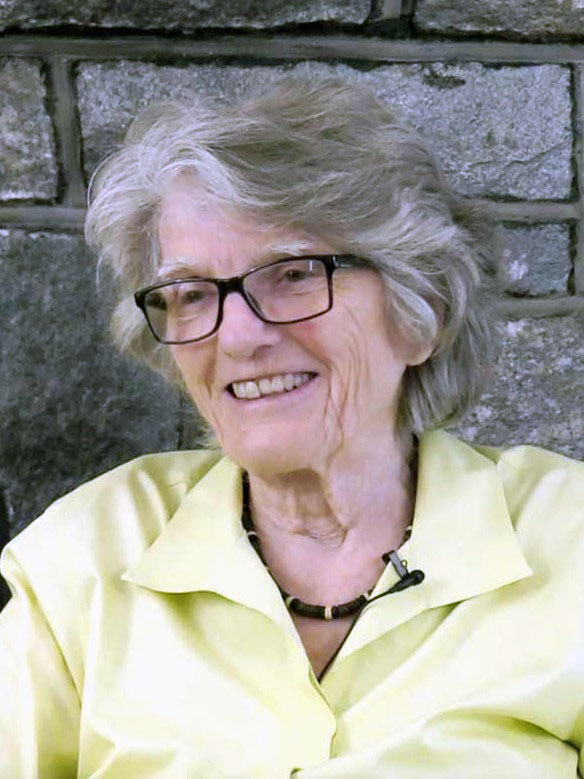AAVC SpotlightBarbara Warne Newell ’51
AAVC SpotlightBarbara Warne Newell ’51
This year, the alumnae/i association, AAVC, turns 150. Throughout 2021, the College will be celebrating this anniversary by highlighting a few of Vassar’s most notable alumnae/i in architecture, arts, business, education, entertainment, healthcare, humanitarian efforts, law, social justice, and technology.

Professional Highlights: President of Wellesley College (1972-1980) and founder of the college’s Center for Research on Women; U.S. Ambassador to UNESCO (1979-1981); Chancellor, Florida State University System (1981-1985).
Accomplishments: Labor economist Barbara Warne Newell has cracked many a glass ceiling while helping others do the same. During her tenure as President of Wellesley College, she was appointed by President Jimmy Carter as the first female U.S. Ambassador to the United Nations Education, Scientific and Cultural Organization (UNESCO). Immediately after that, she was selected as the first woman to lead the State University System of Florida. Throughout her distinguished career, she has been an outspoken and effective advocate for women’s education and economic equity.
When asked how she became interested in the field of economics, Newell replies: “I got there genetically. My father was a professor of economics and at one juncture, I walked into his study and said, ‘When I grow up, I want to be a social worker.’ He looked up from his desk and said, ‘Do you want to help people live through their problems, or do you want to understand why they have problems?’ That persuaded me that I really wanted to look at social problems and their economic cause.”
The first step along this career path was an economics degree from Vassar. “I particularly remember some of the faculty members who shaped my thoughts and directions like Mabel Newcomer, who was a pioneer in her field, and Ruby Turner Morris [class of 1929], who was a dynamic soul and a good friend,” she recalls. “It was a very good department.”
Moving towards her doctorate, Newell applied to what were then the two leading graduate schools in labor economics: Yale University and the University of Wisconsin. At first, she thought she’d go to Yale. “They kindly accepted me but reminded me that I could not teach, I could not do fieldwork,” she remembers. So, she went to Wisconsin, where no such gender-based restrictions were imposed. While in the program, she lost her first spouse to polio; she would later lose her second to cancer.
After completing her doctorate, Newell spent another 20 years in the Midwest at various academic institutions. Eventually returning to the University of Wisconsin, she helped establish the Center for Research on Poverty. “It became a model for such research elsewhere in the country,” Newell observes. In the late 1960s, she became Acting Vice President for Student Affairs at the University of Michigan, as student activism was reaching a fevered pitch there. The university was sued for discrimination against women, and Newell soon found herself deeply involved in women’s issues. Becoming Wellesley College’s 10th president in 1972, she soon established the Center for Research on Women.
“I was concerned that the women’s movement was shouting about problems, whether it was daycare or discrimination, but had not done the research needed to underpin these demands,” she explains. “I wanted to see the establishment of a research center that would give an intellectual base to these social movements and I wanted to have it located in an educational institution that, over time, would remain sympathetic to such focus on women’s concerns. Wellesley, as a women’s college, was just such a spot.”
The Wellesley center tackled many issues of importance to women in the workplace. Examples vary from helping AT&T create its first affirmative action program to conducting groundbreaking research on daycare. “I’ve been pleased to see policymakers put to use the work done at the center,” Newell notes. “The COVID-19 pandemic has further dramatized the role and needs of women in the workforce and as principal caregivers in the home.”
At age 65, Newell started a new chapter. “I got married again,” she relates. “I recommend it if you find the right guy.” Since retirement, Newell has enjoyed traveling with her husband and spending time with her daughter and family in Florida. “I’ve always been curious about the world in which we live,” she says, “and I certainly was raised on the phrase, ‘try to leave the world a better place than you entered.’ I can’t say I’ve always succeeded, but I’ve tried.”